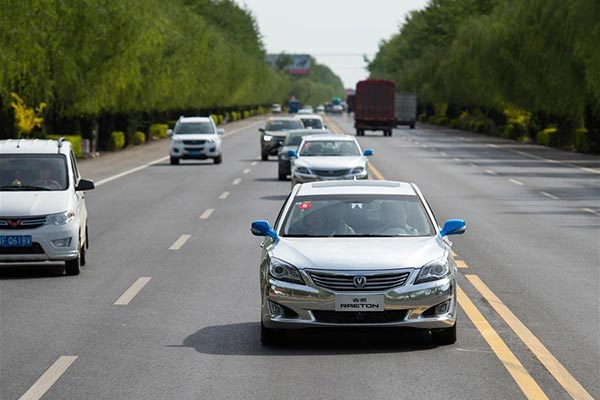 |
|
Changan Automobile's driverless cars run on No 107 National Highway, April 16, 2016. [Photo/Xinhua] |
BEIJING - A successful 2,000-km (1,240 miles) road test is just the beginning of an exciting journey for China's self-driving cars.
Two driverless cars, produced by Changan Automobile, left the southwestern metropolis of Chongqing on Tuesday and arrived in Beijing on Saturday -- China's first long-distance test of autonomous vehicles.
The vehicles succeeded in driving a safe distance from other cars, changing lanes, overtaking as well as some other automatic maneuvers during the five-day test.
"The cars ran up to 120 km per hour on the highway, and adapted to the changing road surface," said Li Yusheng, chief engineer of the project.
There is still room for improvement, Li said.
When driving in small tunnels with dim or no light inside, the cars were slower to respond, said Kong Zhouwei, a tester.
"It was difficult for in-vehicle cameras to recognize the road markings when the external light changed," Kong said. "We will look into laser radar techniques to address this issue."
The designers said a driver was still needed in a few road sections and at gas stations. In addition, trucks that were wider than the lane also posed challenges for the driverless cars.
"This is the sort of real-time information and data that we could not possibly captured in a lab environment," Kong told Xinhua.
Tan Benhong, deputy director of Changan Automobile Engineering & Research Institute, said they would improve the car's systems based on the results of the test.
According to Li, the sensory system needs to be optimized for cars to better respond to changes in light, the lane-line recognition software needs to be tweaked so it takes larger or irregularly-shaped vehicles into consideration, while the sign recognition function must be able to read broken or stained traffic signs.
"The user interface could be more user-friendly for passengers," Li added.
Changan plans to put driverless cars produced exclusively for highway travel into commercial use in 2018, and realize mass production for driverless cars capable of running in complicated urban streets by 2025.
Worldwide, at least 18 companies are developing autonomous cars, including BMW, Audi and Toyota. China's contenders include auto makers BAIC group, GAC Group, SAIC Motor, Changan and BYD.
Some countries have been developing autonomous vehicles for two to three decades, while China's research only began half a decade ago, said Xie Fei, vice-president of China Automotive Engineering Research Institute.
"Those with the most advanced technology and reliable products will lead the industry. The next ten years will be an exciting period," Xie said.
